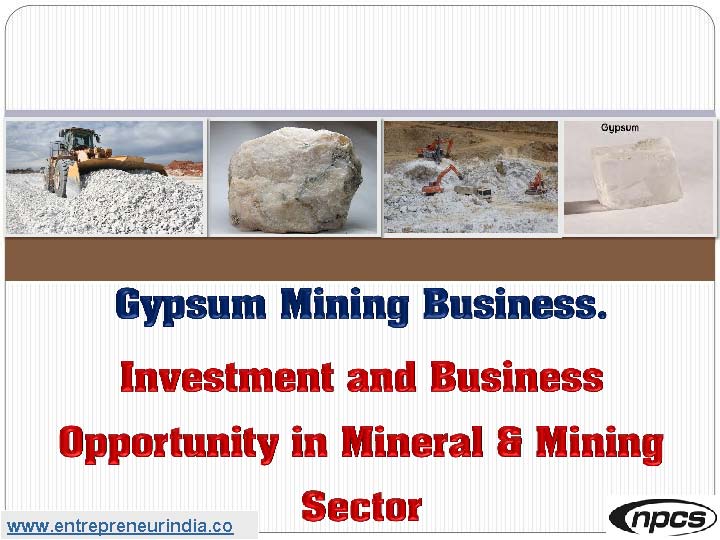
The gypsum mining business plays a fundamental role in supplying one of the most essential minerals used across industries, particularly in construction, agriculture, and manufacturing. Gypsum, a naturally occurring mineral composed of calcium sulfate dihydrate (CaSO?·2H?O), serves as a critical raw material for cement, plaster, drywall (POP), and soil conditioning agents. With rising global infrastructure development and agricultural modernization, gypsum mining has become a highly profitable and sustainable business opportunity.
Rapid Expansion in Infrastructure and Agricultural Demand
As urbanization accelerates and global construction activity increases, the demand for gypsum-based products grows steadily. Additionally, the agriculture sector relies on gypsum to improve soil structure, reduce salinity, and increase crop yield. These dual drivers fuel the consistent demand for high-quality mined gypsum, making the gypsum mining business a highly scalable venture.
Key Applications of Mined Gypsum
Gypsum finds diverse applications across industries:
-
Construction Industry: Used in the production of plaster of Paris, drywall boards, cement, and wall putty
-
Agriculture: Acts as a soil amendment, correcting high sodium levels and improving water infiltration
-
Ceramics and Pottery: Forms molds and supports in ceramic casting
-
Glass and Paper Industry: Used in refining processes and as a filler
-
Medical and Dental Applications: Employed for casting molds and orthopedic supports
This widespread utility ensures a robust market for gypsum throughout the year.
Types of Gypsum Deposits
Gypsum is extracted from various geological formations. The major types include:
-
Alabaster: A fine-grained, translucent variety used for decorative items
-
Selenite: Crystalline and transparent, mostly used for ornamental purposes
-
Rock Gypsum: Commercially mined for industrial use
-
Synthetic Gypsum: Produced as a by-product in industrial processes like flue gas desulfurization
For commercial mining, rock gypsum is the most viable and abundantly available form.
Process of Gypsum Mining
The mining process involves a series of controlled and environmentally sensitive steps:
-
Prospecting and Geological Survey
Identify and assess the quality and quantity of gypsum reserves using geological mapping and sampling. -
Land Acquisition and Lease Agreement
Secure mining rights or lease land through government auctions or direct allotment. -
Mine Planning and Approval
Develop a mining plan approved by the Ministry of Mines and obtain Environmental Clearance and Forest NOC if applicable. -
Excavation and Drilling
Extract gypsum using surface mining methods like open-cast or strip mining with excavators and drills. -
Crushing and Screening
Crush large gypsum rocks and screen them into desired grades and particle sizes. -
Transportation and Storage
Transport to local markets, cement factories, or export hubs using trucks, railways, or bulk carriers.
Gypsum mining generally has lower environmental impact compared to other minerals, making it a preferred choice in eco-sensitive regions.
Equipment and Infrastructure Required
To operate a gypsum mining business, the following machinery and facilities are essential:
-
Bulldozers and Excavators
-
Drilling and Blasting Equipment (if needed)
-
Dumpers and Tippers
-
Crushing Units and Screening Plants
-
Weighbridges and Loaders
-
Workshop for Equipment Maintenance
-
Site Office, Safety Cabin, and Storage Yards
Small-scale mining operations can start with limited capital, whereas large operations may require an investment of ?2–5 crore or more depending on capacity and automation.
Licensing and Legal Requirements
Compliance with national and local regulations is mandatory. Required permits include:
-
Mining Lease from State Government or Central Agency
-
Environmental Clearance from State Pollution Control Board
-
Explosive License (if using blasting)
-
DGMS (Directorate General of Mines Safety) Certification
-
Labor Welfare Registration and Insurance Compliance
-
GST Registration and Trade License
Maintaining transparency and following statutory norms enhances credibility and long-term viability.
Market and Revenue Opportunities
The market for gypsum is both domestic and international:
-
Construction and Cement Manufacturers: Major buyers of bulk gypsum for cement production
-
Fertilizer Producers: Use gypsum in soil conditioners and organic fertilizers
-
POP Manufacturers: Buy fine-grade gypsum powder
-
Export Markets: Middle East, Southeast Asia, and Africa have growing demand
-
Retail and Bulk Distribution: Sell to builders, plasterers, and local contractors
Gypsum prices vary by grade, with industrial-grade selling between ?500 to ?1,000 per tonne and high-purity grades fetching more.
Profitability and Break-even Analysis
The gypsum mining business offers promising profit margins with steady demand. Key profitability factors include:
-
Low Cost of Extraction: Open-cast mining keeps operational costs low
-
High Demand Consistency: Repeated orders from construction and agriculture sectors
-
Bulk Sales Opportunities: Cement and POP plants offer long-term contracts
-
Logistics Efficiency: Proximity to consumption centers reduces transport costs
With proper planning, the business can achieve break-even within 1.5–2 years depending on scale and market linkage.
Environmental and Safety Considerations
Mining must be conducted responsibly with minimal ecological impact:
-
Implement dust suppression systems
-
Conduct periodic reforestation and land reclamation
-
Provide PPE kits and conduct worker safety training
-
Maintain zero-discharge policies with stormwater drainage and sediment traps
-
Follow mine closure and rehabilitation guidelines
Compliance with ESG (Environmental, Social, and Governance) norms also opens doors for funding and partnerships.
Expansion and Value Addition Opportunities
Gypsum mining can be expanded through vertical integration:
-
Set up a POP (Plaster of Paris) Unit nearby
-
Manufacture Gypsum Boards and False Ceiling Panels
-
Produce Gypsum Fertilizer Granules for agri-use
-
Crush and Pulverize for White Cement Plants
These value-added processes enhance margins and strengthen brand presence in the market.
Conclusion
The gypsum mining business presents a sustainable and profitable opportunity for entrepreneurs with access to mineral-rich lands and a vision for industrial supply. With growing demand from construction, agriculture, and manufacturing sectors, gypsum remains a high-value mineral with consistent utility. By adopting eco-friendly mining practices, maintaining compliance, and focusing on logistics and quality, investors can build a long-term asset with strong returns.
Niir Project Consultancy Services
An ISO 9001:2015 Company
106-E, Kamla Nagar, Opp. Spark Mall,
New Delhi-110007, India.
Email: npcs.ei@gmail.com , info@entrepreneurindia.co
Tel: +91-11-23843955, 23845654, 23845886, 8800733955
Mobile: +91-9811043595
Website: www.entrepreneurindia.co , www.niir.org





